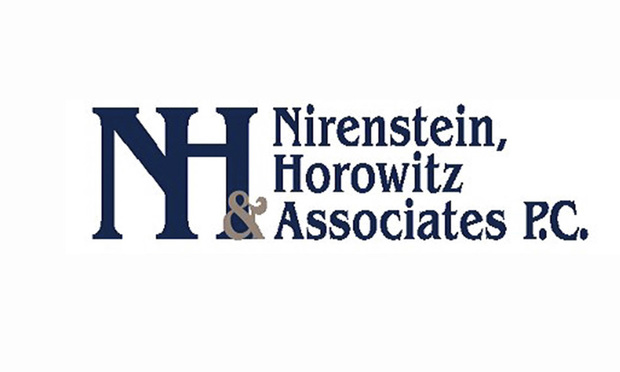Risky Business: Malpractice Suit Alleges Hartford Firm Got a Fee for Referring Client to Fraudster
"Cases like these can be useful for lawyers doing risk analysis," said Mark Dubois, an expert on attorney ethics.
June 29, 2020 at 07:44 PM
5 minute read
 The logo of Hartford law firm Nirenstein, Horowitz & Associates. Courtesy photo
The logo of Hartford law firm Nirenstein, Horowitz & Associates. Courtesy photo
A Hartford-based law firm specializing in elder law, probate and estate planning faces a malpractice lawsuit for referring a client to a man who's pleaded guilty of perpetrating a long-running fraud.
But the statute of limitations might be in its favor, experts said.
Plaintiff Cheryl Bonomo sued her former counsel at Nirenstein, Horowitz & Associates in state court June 22. She wants to hold the law firm accountable for money she says she lost from a financial adviser, Thomas Renison, who faces a regulatory lawsuit for allegedly defrauding seniors of about $6 million.
Bonomo alleged that for about a decade, beginning in 2008, Renison stole about $400,000 from her.
Her lawsuit claimed Renison shared office space with Nirenstein Horowitz. It alleged Barry Horowitz, the president of the law firm, recommended Renison to Bonomo for her probate case, and that Renison compensated Horowitz for the referral.
This allegation suggests a potential conflict of interest, but experts point to potential good news for the law firm: The window might have already closed for Bonomo to file suit.
"The plaintiffs will have a significant problem because the statute of limitations in Connecticut for legal malpractice is three years," said Leslie Levin, professor at the University of Connecticut School of Law. "The plaintiff is alleging conduct going back 12 years. The court is not likely to look at conduct more than three years before the lawsuit was filed."
Levin, who isn't involved in the litigation, continued: "We really need to know more of the facts to really say how it will likely come out, but the statute of limitations is an issue."
Guilty Plea
The Securities and Exchange Commission barred Renison from conducting business in 2014, according to court filings. But Bonomo alleged Renison skirted the SEC, and formed a limited liability company, ARO Equity LLC, through a third party to ask for money from investors, including Bonomo.
Earlier this month, Renison, a South Glastonbury resident, pleaded guilty in Massachusetts to conspiracy to commit wire fraud and filing a false tax return in a case unrelated to Bonomo's.
Bonomo said the law firm was negligent in referring her to him.
"The defendant knew or should have known that Renison, as early as 2008, defrauded one or more of his clients," her complaint alleged.
Bonomo pointed to the SEC's actions in 2014, but said the law firm "failed to make the plaintiff aware of the dangerous and detrimental conduct of Renison until June 5, 2019." She says she was the victim of a Ponzi scheme in which Renison "led his investors, including the plaintiff, to believe that any monthly profits she received came from a legitimate investment, when, in reality, other investors were the source of the profits."
Risk Analysis
Mark Dubois, the state's first chief disciplinary counsel, said Monday there is a cautionary tale for all attorneys.
"Cases like these can be useful for lawyers doing risk analysis," said Dubois, an attorney at Geraghty & Bonnano. "There's always a risk when a lawyer makes a referral for a client to a third party. … Does the client understand the limitations of your reference, and that you are not making any guarantees or representations?"
Meanwhile, the plaintiff is pressing ahead in court, as her lawyer says Nirenstein Horowitz has not responded to his inquiries.
"I am optimistic of prevailing. I am still waiting to hear the explanation from a fellow lawyer as to what happened here," Bonomo's attorney, Milford solo practitioner Chuck Kurmay, said Monday. "There is still no explanation or an effort made to make this woman whole."
Kurmay said he'd be seeking "at least an immediate and full restitution of $400,000″ for his client.
"The problem is not going away," he said. "And neither will we."
Horowitz, the partner at the defendant law firm, was on vacation and not available at presstime. His office referred all comment to his lawyer, Brian Palmeri.
"Attorney Horowitz strongly denies the claims, and we look forward to presenting our defense in court," said Palmeri, a partner with Winget, Spadafora & Schwartzberg in Stamford.
The defense has yet to respond in court to the lawsuit.
Related stories:
This content has been archived. It is available through our partners, LexisNexis® and Bloomberg Law.
To view this content, please continue to their sites.
Not a Lexis Subscriber?
Subscribe Now
Not a Bloomberg Law Subscriber?
Subscribe Now
NOT FOR REPRINT
© 2025 ALM Global, LLC, All Rights Reserved. Request academic re-use from www.copyright.com. All other uses, submit a request to [email protected]. For more information visit Asset & Logo Licensing.
You Might Like
View All
Trump's DOJ Delays Releasing Jan. 6 FBI Agents List Under Consent Order
3 minute read

DC Lawsuits Seek to Prevent Mass Firings and Public Naming of FBI Agents
3 minute read
Law Firms Mentioned
Trending Stories
- 1Big Law's Middle East Bet: Will It Pay Off?
- 2'Translate Across Disciplines': Paul Hastings’ New Tech Transactions Leader
- 3Milbank’s Revenue and Profits Surge Following Demand Increases Across the Board
- 4Fourth Quarter Growth in Demand and Worked Rates Coincided with Countercyclical Dip, New Report Indicates
- 5Public Notices/Calendars
Who Got The Work
J. Brugh Lower of Gibbons has entered an appearance for industrial equipment supplier Devco Corporation in a pending trademark infringement lawsuit. The suit, accusing the defendant of selling knock-off Graco products, was filed Dec. 18 in New Jersey District Court by Rivkin Radler on behalf of Graco Inc. and Graco Minnesota. The case, assigned to U.S. District Judge Zahid N. Quraishi, is 3:24-cv-11294, Graco Inc. et al v. Devco Corporation.
Who Got The Work
Rebecca Maller-Stein and Kent A. Yalowitz of Arnold & Porter Kaye Scholer have entered their appearances for Hanaco Venture Capital and its executives, Lior Prosor and David Frankel, in a pending securities lawsuit. The action, filed on Dec. 24 in New York Southern District Court by Zell, Aron & Co. on behalf of Goldeneye Advisors, accuses the defendants of negligently and fraudulently managing the plaintiff's $1 million investment. The case, assigned to U.S. District Judge Vernon S. Broderick, is 1:24-cv-09918, Goldeneye Advisors, LLC v. Hanaco Venture Capital, Ltd. et al.
Who Got The Work
Attorneys from A&O Shearman has stepped in as defense counsel for Toronto-Dominion Bank and other defendants in a pending securities class action. The suit, filed Dec. 11 in New York Southern District Court by Bleichmar Fonti & Auld, accuses the defendants of concealing the bank's 'pervasive' deficiencies in regards to its compliance with the Bank Secrecy Act and the quality of its anti-money laundering controls. The case, assigned to U.S. District Judge Arun Subramanian, is 1:24-cv-09445, Gonzalez v. The Toronto-Dominion Bank et al.
Who Got The Work
Crown Castle International, a Pennsylvania company providing shared communications infrastructure, has turned to Luke D. Wolf of Gordon Rees Scully Mansukhani to fend off a pending breach-of-contract lawsuit. The court action, filed Nov. 25 in Michigan Eastern District Court by Hooper Hathaway PC on behalf of The Town Residences LLC, accuses Crown Castle of failing to transfer approximately $30,000 in utility payments from T-Mobile in breach of a roof-top lease and assignment agreement. The case, assigned to U.S. District Judge Susan K. Declercq, is 2:24-cv-13131, The Town Residences LLC v. T-Mobile US, Inc. et al.
Who Got The Work
Wilfred P. Coronato and Daniel M. Schwartz of McCarter & English have stepped in as defense counsel to Electrolux Home Products Inc. in a pending product liability lawsuit. The court action, filed Nov. 26 in New York Eastern District Court by Poulos Lopiccolo PC and Nagel Rice LLP on behalf of David Stern, alleges that the defendant's refrigerators’ drawers and shelving repeatedly break and fall apart within months after purchase. The case, assigned to U.S. District Judge Joan M. Azrack, is 2:24-cv-08204, Stern v. Electrolux Home Products, Inc.
Featured Firms
Law Offices of Gary Martin Hays & Associates, P.C.
(470) 294-1674
Law Offices of Mark E. Salomone
(857) 444-6468
Smith & Hassler
(713) 739-1250










